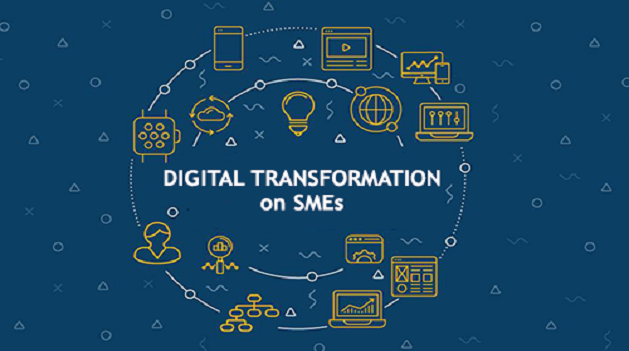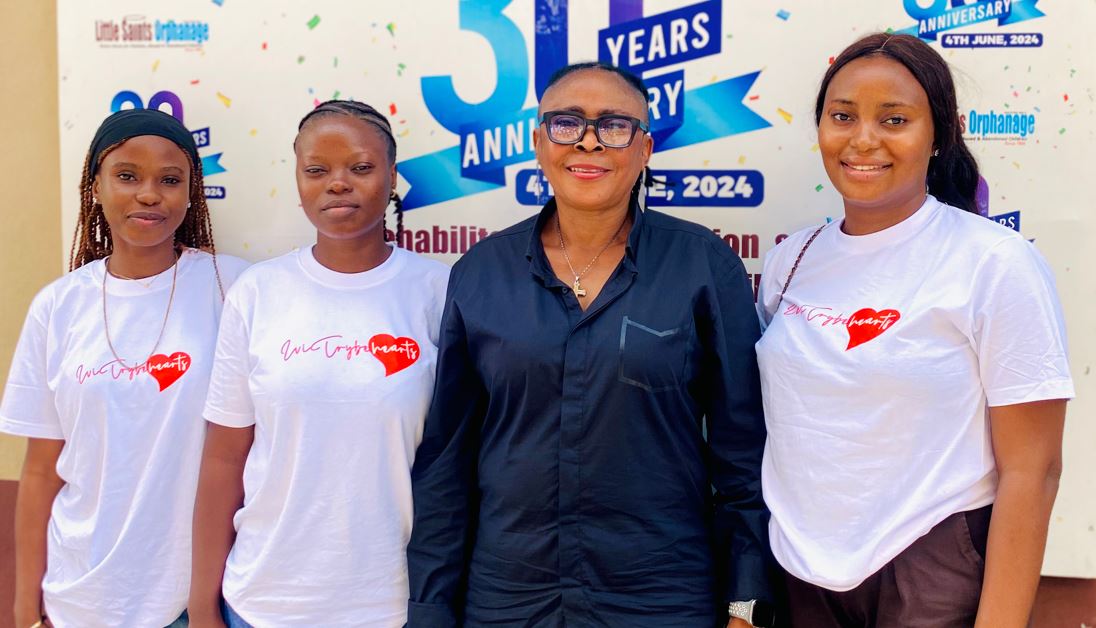News
Report Finds Africa’s SMEs Grapple with Tech Costs, Skills Dearth

Although small and medium enterprises (SMEs) in Africa are increasingly investing in digital technologies, their innovation journey is hindered by the high cost of technology upgrades, the lack of digital skills, and regulatory and compliance issues.

This is the key findings of a research report, titled “Levelling the SME playing field”, jointly commissioned by Vodacom Group, Vodafone Group and Safaricom.
It is the sixth research paper under the Africa.connected initiative, which aims to drive sustainable development by closing the digital divide in Africa’s key economic sectors through strategic partnerships.
The research is based on conversations with 400 SMEs across eight African countries − South Africa, Kenya, Egypt, Ethiopia, Mozambique, Tanzania, the Democratic Republic of the Congo and Lesotho − ranging in size from one to 200 employees.
The survey is run in partnership with World Wide Worx, a local research firm that focuses on trends in information technology and telecommunication.
According to the findings, digitalisation has been a game-changer for African SMEs, with the respondents highlighting the positive effect of technology on enhancing growth, efficiency, competitiveness and customer service.
Nearly 70% of surveyed SMEs invested in technology in the past 12 months to help boost growth and resilience – an indication that SMEs are embracing the positive impact of technology, reveals the survey.
While there are numerous opportunities that unlock the full potential of digitalisation for these businesses, addressing barriers − such as infrastructure, connectivity, the high cost of implementing technology, lack of adequate tech skills and developing best practice frameworks for better collaboration − remains key to business growth.
“SMEs play a pivotal role in both the global and African economy, contributing to job creation, innovation, economic growth and regional development,” says Shameel Joosub, Vodacom Group CEO.
“In fact, the World Bank reports that SMEs are responsible for more than 80% of Africa’s employment and 50% of the GDP.
“But SMEs in Africa face a number of distinct challenges, which include access to finance and markets, regulatory barriers, inadequate technology adoption and limited management capabilities. To address these stumbling blocks, strides must be made to promote financial inclusion, simplify regulation, enhance technological infrastructure and encourage innovation. The technology pieces of this puzzle – as our research shows – are incredibly important.”
When it comes to technology use and adoption, the research shows SMEs work relentlessly to secure finance to address the high costs of technology and the associated implementation. But the initial start-up costs are only the beginning of what will be required throughout their digital journey.
In the study, 58% of respondents cited the high cost of technology upgrades and renewals as key hindrances (39% in SA), with 32% citing difficulty in integrating new technologies with existing systems and regulatory confinements.
Limited internet connectivity and access affects 30% of respondents (17% in SA), while 14% grapple with lack of support and training for employees to use technology (39% in SA).
SMEs that have integrated technology into their business are increasingly making use of e-commerce platforms, social media and digital payment solutions, such as e-wallets and micro-financing services. Innovative use of data analytics tools can further help SMEs to expand their reach, access valuable data insights and streamline operations, according to the report.
Unfortunately, the workforce is often resistant to digitisation, especially those working for SMEs with strong human relationships.
The lack of digital skills and knowledge, support and training for employees and executives around the values and use of specific tools and technologies compound this issue, states the survey.
Added to this, SMEs can no longer ignore the threat of cyber security concerns, as criminal attacks or breaches do not discriminate against business size, it points out.
To reap the many benefits that technology brings, laying the right foundations is key.
“This starts with investing in training for employees, either through online resources, hiring IT consultants, or partnering with local technology firms to equip teams with the skills and knowledge needed to manage the challenges of the digital landscape.”
Regulatory and compliance issues can be a significant hurdle, so it’s vital that regulators develop effective policies rooted in a deep understanding of the myriad constraints SMEs face and implement targeted programmes that empower these small ventures to succeed.
“While these businesses might be ‘small’, their impact is significant, which is why it is essential that regulatory bodies are willing to engage in discussions with SMEs regarding compliance requirements.
“Regulators should also assist smaller firms in navigating different regulatory frameworks. This is crucial when it comes to data and its utilisation. For SMEs, much like any other business regardless of size or industry, the ability to access the right data can provide a critical competitive-edge and enable them to better fulfil customer needs,” notes the survey.
News
OAU Taps Aderounmu, Tech Advocate as DVC Academics

Obafemi Awolowo University (OAU), Ile-Ife, has appointed Professor Adesola Aderounmu, renowned computer scientist and technology advocate, as its new Deputy Vice-Chancellor (Academics).

Professor Adesola Aderounmu
The decision, made by the university’s Senate, marks a strategic step towards aligning OAU’s academic vision with technological innovation and global best practices.
A distinguished scholar and leader in Computer Science and Engineering, Professor Aderounmu brings decades of experience to this pivotal role.
He has served as the Centre Lead for the African Centre of Excellence in Software Engineering and the Obafemi Awolowo University Knowledge Park (OAK-Park), where he has driven initiatives that advance technological innovation and academic excellence.
His leadership journey includes serving as Dean of the Faculty of Technology and Head of the Department of Computer Science, as well as President of the Nigeria Computer Society from 2015 to 2019. Under his stewardship, the Africa Centre of Excellence in ICT (OAK-Park) was established and has flourished, positioning OAU as a hub for digital transformation in Nigeria and across Africa.
“This is an opportunity to shape the future of education at OAU,” Professor Aderounmu stated. “I am committed to fostering an environment where ideas thrive.”
Professor Aderounmu’s appointment as DVC Academics carries significant implications for the information technology profession and industry in Nigeria and Africa.
His leadership is expected to further bridge the gap between academia and industry, aligning curriculum with emerging technological trends, and fostering research that directly addresses the needs of Nigeria’s evolving digital economy.
His commitment to developing high-level ICT talent will contribute to strengthening the nation’s capacity in critical areas such as artificial intelligence, cybersecurity, software engineering, and digital entrepreneurship.
As Nigeria and Africa continue to embrace digital transformation, this appointment signals a continued push for collaboration between universities and the technology industry, ensuring that graduates are equipped with globally relevant skills while advancing innovative research that supports the tech ecosystem.
This appointment recognises Professor Aderounmu’s unwavering commitment to research, excellence in education, and visionary leadership, and marks a significant milestone in the university’s ongoing mission to deliver impactful education and innovation for national and continental development.
News
IviTrybe Hearts Takes Kindness Drive to Little Saints Home

In a heartwarming demonstration of corporate social responsibility and community impact, IviTrybe Hearts, a key initiative driven by members of IviTrybe – a vibrant group of budding marketing communications specialists – visited the Little Saints Orphanage, Akowonjo branch.

The visit, part of IviTrybe’s ongoing commitment to societal betterment, was significantly supported by Pladis Foods Nigeria, which generously donated gift items and products.
IviTrybe is a social responsibility initiative of IVI PR, a dynamic public relations agency dedicated to not only elevating brands but also fostering positive societal impact. This initiative provides focused practical training covering brand strategy and public relations, directly addressing the critical issue of insufficiently skilled manpower within Nigeria’s Public Relations industry. Through the #IviTrybeHearts program, the group channels its growing expertise into meaningful community engagement.
During the visit, the IviTrybe Hearts team dedicated the day to creating a memorable and impactful experience for the children. Activities included extensive bonding and interaction sessions, where members engaged in games and companionship, fostering an atmosphere of joy and connection. Essential items were donated to support the orphanage’s daily needs, and motivational talks were delivered, inspiring the children with words of encouragement and hope for their futures.
Busari Toheeb Dolapo, IviTrybe Coordinator and spokesperson for the project, underscored the essence of the visit, stating, “For whom much is given, much is expected. We have been empowered through knowledge and mentorship at IVI PR, and it’s only right that we channel that privilege into making a difference. The smiles on the children’s faces today reminded us why giving back is non-negotiable.”
The management of Little Saints Orphanage expressed profound gratitude for the support and the tangible impact of the donations, emphasising how such gestures significantly improve the lives and spirits of the children under their care.
Through impactful initiatives like IviTrybe Hearts, IviTrybe continues to exemplify how youth-led action, empowered by practical training and a strong sense of responsibility, can effectively shape communities and enrich lives for the better.
News
INTERPOL Report Shows Cybercrime is West, East African Most Dominant Security Concern

Cybercrime has emerged as a dominant security concern across Africa, with more than 30 percent of all reported crimes in Western and Eastern regions linked to cyber activity, according to the newly released 2025 Africa Cyberthreat Assessment Report by INTERPOL.

The report, based on data from African member states and private sector partners, reveals that two-thirds of surveyed countries describe cybercrime as constituting a medium to high share of total criminal cases.
This highlights how cyber-enabled criminal activity is evolving rapidly across the continent. The report identified alarming spikes in scam attempts, with some countries witnessing a 3,000 percent increase in suspected scam notifications in the past year.
Neal Jetton, INTERPOL’s Cyber Crime Director, warned that the threat landscape is evolving faster than enforcement responses.
“This fourth edition of the INTERPOL African Cyber Threat Assessment provides a vital snapshot of the current situation, informed by operational intelligence, extensive law enforcement engagement, and strategic private-sector collaboration.
“It paints a clear picture of a threat landscape in flux, with emerging dangers like AI-driven fraud that demand urgent attention. No single agency or country can face these challenges alone,” Jetton stated.
In the past year, suspected scam notifications rose by up to 3,000 per cent in some African countries, according to data from Kaspersky, one of several private sector partners that work with INTERPOL’s cybercrime directorate
Online scams, particularly through phishing, are the most frequently reported cybercrimes across the continent. Ransomware attacks and Business Email Compromise (BEC) incidents are also increasing, particularly in Nigeria, Kenya, South Africa, and Egypt.
“Ransomware detections in Africa also rose in 2024, with South Africa and Egypt suffering the highest number, at 17,849 and 12,281 detections respectively, according to data from Trend Micro, followed by other highly digitised economies such as Nigeria (3,459) and Kenya (3,030),” it stated.
Incidents included attacks on critical infrastructure, such as a breach at Kenya’s Urban Roads Authority (KURA), and on government databases, such as hacks of Nigeria’s National Bureau of Statistics (NBS), the report stated.

 General News3 days ago
General News3 days agoNigeria’s BNPL Market is Projected to Value @ $2.6B by 2030

 Telecom3 days ago
Telecom3 days agoFree WiFi Meets Mega Entertainment at the Grand Opening of Solution Fun City

 E-Financial3 days ago
E-Financial3 days agoNIA Puts Industry Written Premium @ N1.5trn in 2024

 Telecom3 days ago
Telecom3 days agoInstagram Safety Tools Every Parent Should Know About

 Telecom3 days ago
Telecom3 days agoV-Malaysia 2025: QNET Strengthens Global Network with Landmark 5-Day Event

 E-Financial3 days ago
E-Financial3 days agoUN and Sterling One Foundation Lead Coalition Ahead of ASIS 2025

 News3 days ago
News3 days agoINTERPOL Report Shows Cybercrime is West, East African Most Dominant Security Concern

 E-Financial12 hours ago
E-Financial12 hours agoShareholders Oppose Transfer of Unclaimed Dividend to CBN




























